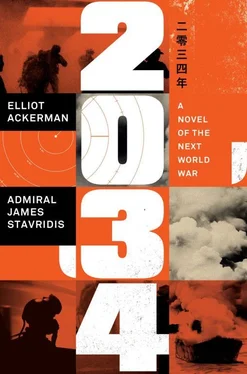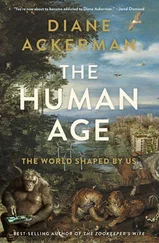While Farshad was immersed in Russia’s advance into Polish territory, pleased to have found himself useful to naval commanders supporting a ground invasion, a hawkish faction of the Revolutionary Guards decided it was time for Iran to assert control of the long-contested Strait of Hormuz. The Revolutionary Guards, using their smaller fleet of speedboats, had brashly chosen to seize the first large international ship making the transit, a freighter owned by TATA NYK, the company’s name being an alphabet soup of meaningless letters that proved relevant to Farshad in only one way: the ship was Indian.
It was a particularly foolish choice for the Revolutionary Guards, who’d acted without the express approval of the chief of staff of the Armed Forces, Major General Bagheri, although his detractors speculated he’d known all along. Now Farshad’s government was in the unenviable position of having to de-escalate tensions while also not losing face or delegitimizing its long-running claim over the strait. In short, what General Bagheri needed was someone who had ties to both the Revolutionary Guards and to the regular military. Someone who could speak credibly for both. And who was a naval officer. Farshad knew, before the message ever arrived for him from Tehran, that he was the single person who fit this description.
He had flown commercial out of Moscow direct to New Delhi. This wasn’t because the Russian or Iranian military lacked the resources to fly him officially, but because neither his government nor the Indians had officially acknowledged they were willing to negotiate. He would, ostensibly, be traveling to New Delhi as a private citizen. Farshad’s mission was a delicate one. He understood that India’s old adversary, Pakistan, would be more than willing to aid his country if asked, and he also understood that the Indians could potentially throw their weight behind the Americans if pushed too far. The slightest misstep by either party could lead to a further escalation of what was already a global conflict, or, put another way, a world war.
Crammed into a center seat on his Aeroflot Airbus A330, he followed his flight’s progress. On the monitor affixed to the seatback in front of him, an icon of their plane left a tiny trail of bread crumbs across the globe. As he considered the map, Farshad reflected on how quickly tensions had escalated between the Americans and Chinese, two nations, unlike his own, that had a major stake in preserving the world order. From the Wén Rui incident, to the succession of naval battles fought between the US and Chinese fleets, to the invasion of Taiwan and the US nuclear strike on Zhanjiang, so much of what had occurred since March defied the logic of both nations’ interests.
Unless that logic had changed.
No one—neither politicians nor pundits—had yet to refer to this conflict as the Third World War. Farshad wondered if India’s involvement, or perhaps even Pakistan’s, would be enough to bestow on this crisis that grim name, with its apocalyptic connotations. Farshad doubted it.
The involvement of other nations wasn’t what would make this a Third World War. It would take something else….
At Zhanjiang the Americans had used a nuclear weapon, but it was tactical, its payload and the fallout both manageable and imaginable—the equivalent of a single, devastating natural disaster. No nation—America, China, or otherwise—had yet to dip into its arsenal of strategic nuclear weapons. The doomsday weapons.
Farshad’s ears popped.
The engines on the Airbus A330 groaned as they hurried their descent.
The plane landed and Farshad passed through immigration without incident. He had brought only one carry-on bag and within minutes was standing in the overcrowded arrivals hall, surrounded by the joyful embraces of travelers reunited with their loved ones. However, no one was there to meet him. His instructions from General Bagheri’s staff hadn’t extended beyond this point. He’d been assured that his Indian counterpart would find him here. He sat at a crowded Starbucks without ordering. His mind wandered. Watching the crowd, he began to think of the many names the people in it had for one another—whether it be mother , father , son , daughter , or simply friend —and how that might all vanish in an instant, in a flash, because of that single, other obliterating name we give to one another: enemy .
Interrupting Farshad’s thoughts, a stranger asked if he could sit in the empty seat at his table. Farshad gestured with his hand and the stranger, a man who was perhaps a decade older, joined him. Farshad continued to consider the crowd.
The stranger asked if he was waiting for someone. Farshad said that he was.
“Who?” asked the stranger.
Farshad considered him for a moment. “A friend, I guess.”
The man extended his hand, introducing himself. “I am Vice Admiral Anand Patel, a friend.”

22:46 July 19, 2034 (GMT+5:30)
New Delhi
Chowdhury was returning late to the US embassy. Diplomatic tensions being what they were, he was obliged to sleep there. His mother, however, had determined that it would be best if she and his daughter stayed with Chowdhury’s uncle. Though his days had been busy, Chowdhury committed himself to having dinner every night with Ashni. He had been in New Delhi for almost a week and the routine of early mornings, full days, and late-night returns to the embassy from his uncle’s house east of the Yamuna River was quickly wearing him out. He dozed in the back of the cab, remembering the last week as though it were a dream while he skirted Nehru Park. Within hours of the Iranians’ claiming autonomous control of the Strait of Hormuz and seizing the tanker owned by TATA NYK, Trent Wisecarver had called Chowdhury into his office and told him he would be “heading back to New Delhi.”
The way Wisecarver had said “back” hadn’t sat well with Chowdhury. Amid this conflict, a resurgent nativism was beginning to possess the American psyche, as it had in other conflicts, a phenomenon Chowdhury had witnessed that night with Samantha at the empty City Lights restaurant. Perhaps Wisecarver hadn’t meant anything by it; perhaps when he said “back” he was referring to his prior mission to New Delhi to retrieve the downed Marine pilot. But Chowdhury couldn’t shake his suspicions.
After the strike on Zhanjiang, Wisecarver had cleaned house within the national security staff. The country, unlike in generations past, had failed to come together when confronted by the specter of a world war, even a nuclear one. A strike against the American homeland seemed inevitable, though no one could know where or in what shape it would manifest—a dirty bomb planted by a sleeper cell, a warhead on the tip of a ballistic missile, or perhaps both? Decades of partisan division had taken their toll, and the administration was under fire from all sides, from the hawks who believed the tactical nuclear strike hadn’t gone far enough to the doves who believed America had abdicated its moral authority by employing such weapons. To respond to whatever came next, Wisecarver needed true loyalists. Which was to say he needed people who owed their positions in the administration not to their competencies, but to him alone. And so Chowdhury had been quietly sent “back” to New Delhi to deal with the new crisis in the Strait of Hormuz.
When Chowdhury arrived at the embassy, he checked his email a last time before heading to bed and saw that he had a message from another colleague who had been banished in Wisecarver’s putsch, Rear Admiral John Hendrickson: Bunt.
The two had left Washington at about the same time, though Hendrickson’s journey had been longer and more treacherous, and his mission equally complex. It was, in its way, also a diplomatic mission. Sarah Hunt, his “old friend and colleague” (this was how Hendrickson always referred to her), had at Zhanjiang launched the first nuclear strike in almost a century. On her orders millions had been killed. The strain must’ve been enormous. With the leadership in the White House bracing for the Chinese response to Zhanjiang, every commander in the field needed to be ready to deliver a swift counterpunch. Hesitation could be disastrous. Which was why Hendrickson was being sent to check on Hunt, to assess her state of mind. The fuzzy language Wisecarver had given him was “augment her command.”
Читать дальше













